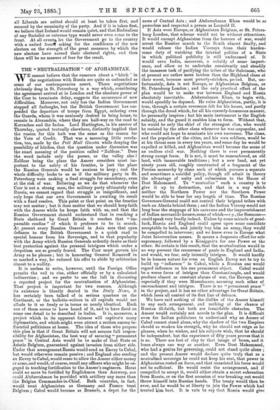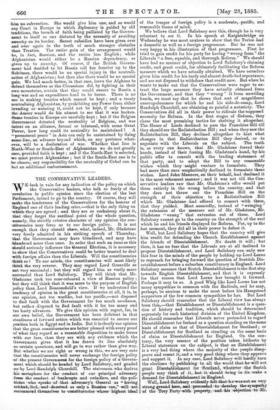THE " NEUTRALISATION " OF AFGHANISTAN.
WE cannot believe that the rumours about a " hitch " in the negotiations with Russia are quite so unfounded as some of our contemporaries assert. Those negotiations obviously drag in St. Petersburg in a way which, considering the agreement arrived at in London and the absolute power of the Czar to terminate delay, suggests the occurrence of new difficulties. Moreover, not only has the Indian Government stopped all furloughs, but the British Government has suspended the departure of troops from Egypt, ordering even the Guards, whom it was anxiously desired to bring home, to remain in Alexandria, where they are half-way on the road to Kurrachee and the Indus. Lord Hartington, in his answer of Thursday, quoted textually elsewhere, distinctly implied that the reason for this halt was the same as the reason for the Vote of Credit. That was a menacing little revelation, too, made by the Pall Mall Gazette while denying the possibility of bitches, that the question under discussion was the exact meaning of the position called "Zulficar." Does the word include only the passes, or the valley also ? Zulficar being the place the Ameer considers most important to the safety of his frontier, is just the place the Russian Generals would be anxious to keep ; and the whole difficulty looks to us as if the military party in St. Petersburg were making a final struggle for ascendancy, even at the risk of war. Believing as we do that whenever the Czar is not a strong man, the military party ultimately rules Russia, we cannot regard that struggle as insignificant, and only hope that our own Government is awaiting its result with a fixed resolve. This point or that point on the frontier may not matter ; but it does matter that we should keep faith with the Ameer while he keeps faith with us, and that the Russian Government should understand that in reaching a State sheltered by Great Britain it reaches that " impassable confine " of which it professes to be in search. At present every Russian General in Asia sees that open defiance to the British Government is a quick road to special honour from his Sovereign, and to that popularity with the Army which Russian Generals ardently desire as their best protection against the personal intrigues which under a despotism are so greatly feared. The Czar must govern his Army as he pleases ; but in honouring General Komaroff in so marked a way, he reduced his offer to abide by arbitration almost to a nullity.
It is useless to write, however, until the Foreign Office permits the veil to rise, either officially or by a calculated indiscretion ; and we prefer to use the lull in discussing a reported project for the neutralisation of Afghanistan. That project is important for two reasons. Although its existence is bluntly denied in the Daily News, it has certainly been talked of in serious quarters on the Continent, or the bulletin-writers in all capitals would not allude to it so freely or in terms so nearly identical. Each one of them seems to have heard of it, and to have fixed on some one detail to be described in italics. It is, moreover, a project which in its apparent fairness will captiva4e many diplomatists, and which might even attract a section among influential politicians at home. The idea of those who propose this plan is that if Great Britain will not assume full responsibility for Afghanistan, the best way of securing " permanent peace " in Central Asia would be to make of that State an Asiatic Belgium, guaranteed against invasion from either side. Under that arrangement Russia would send an Envoy to Cabal, but would otherwise remain passive ; and England also sending an Envoy to Cabal, would cease to allow the Ameer either money or arms, and would, of course, recall any officers who might be engaged in teaching fortification to the Ameer's engineers. Herat could no more be fortified by Englishmen than Antwerp, nor could Abdurrahman be provided with artillery any more than the Belgian Commander-in-Chief. Both countries, in fact, would treat Afghanistan as Germany and France treat Belgium ; Cabal would become as Brussels, a depot for the
news of Central Asia ; and Abdurrahman Khan would be as powerless and respected a person as Leopold IL
If Asia were Europe, or Afghanistan Belgium, or St. Petersburg London, that scheme would not be without attractions. It would exempt Afghanistan from the horrors of war, would arrest the Russian march to the Scnth almost finally, and would release the Indian Viceroys from their burdensome duty of watching the internal politics of a State in which political publicity is still undreamed of. It would save India, moreover, a subsidy of some importance, and allow us to undertake consistently and steadily the immense task of pacifying the tribes of the Suleiman, who at present are rather more lawless than the Highland clans at their worst, because most poverty-stricken, period. But, unfortunately, Asia is not Europe, or Afghanistan Belgium, or St. Petersburg London ; and the only practical effect of the plan would be to make war between England and Russia absolutely inevitable. Abdurrahman Khan, to begin with, would speedily be deposed. He rules Afghanistan, partly, it is true, through a certain reverence felt for his house, and partly through the dread which, for all his coarsely-humorous manner, he personally inspires ; but his main instrument is the English subsidy, and the guard it enables him to form. Without that, he would be only the chief of the strongest clan, who would be resisted by the other clans whenever he was unpopular, and who could not hope to nominate his own successor. The clans and the populace of the cities, and his own soldiers, would be at his throat once in every ten years, and some day he would be expelled or killed, and Afghanistan would become the scene of an endless civil war. Nothing there is ever permanently strong except force. It is not, it must be remembered, an old land, with immovable traditions ; but a new land, not yet ninety years old, roughly constructed of a fragment of the Persian monarchy by clans each of which pursues a separate and sometimes a suicidal policy, though all admit in theory the advantage of unity and submission to the House of Dost Mahommed. To " neutralize " such a country is to give it up to destruction, and that in a way which neither the Northern Power nor the Southern Power would be able to bear for any length of time. The Russian Governors-General could not control their brigand tribes with such an Alsatia behind them ; and the Indian Viceroy would not long bear the stoppage of his caravans and the impoverishment of Indian mercantile houses, some of which—e.g., the Sammons— could speak very loudly indeed. Unless by some miracle of goodluck, Russia and England could agree upon some candidate acceptable to both, and jointly buy him an army, they would be compelled to intervene; and we know even in Europe what Joint Intervention means. It means a desperate effort for sole supremacy, followed by a lioniggriitz for one Power or the other. So certain is this result, that the neutralisation would in no way prevent the recurrence of panic in England and India, and would, we fear, only intensify intrigue. It would hardly be in human nature for even an English Envoy not to try to build up influence " in Cabal, while a Russian one would regard influence as his one permanent object. Cabal would be a worse focus of intrigue than Constantinople, and would produce almost as constant alarms of war, the Envoys, more especially if they were Mussulmans, accusing each other of encroachment and intrigue. There is no "permanent peace" in the project, and it has no other advantage for Great Britain, which loses all control of its first line of defence.
We have said nothing of the dislike of the Ameer himself to any such arrangement, and nothing of the chance of Russian ill-faith, but both are formidable obstacles. The Ameer would certainly not accede to the plan. It is difficult even for Indian politicians to understand why an Ameer of Cabul cannot stand alone, why the shadow of the two Empires should so weaken his strength, why he should not reign as he pleases, when he wishes, and his subjects wish, that he should be independent, but the experience of fifty years proves that it is so. There are feet of clay to that image of brass, and it leans always one way or another. Even Dost Mahommed, who had a genius for governing, could not stand quite alone ; and the present Ameer would declare quite truly that as a neutralised sovereign he could not keep his seat, that power in Afghanistan rested on force, and that unassisted his force would not be sufficient. He would resist the arrangement, and if compelled to accept it, would either obtain a secret subvention from Russia, or on the first occasion of war breaking out would throw himself into Russian hands. The treaty would then be over, and he would be at liberty to join the Power which had treated him best. It is vain to say that Russia would give him no subvention. She would give him one, and so would any Court in Europe in which diplomacy is guided by old traditions, the breach of faith being palliated by the Government to itself as one dictated by the necessity of avoiding anarchy on its border. 'Secret subsidies have been given over and over again in the teeth of much stronger obstacles than Treaties. The entire gain of the arrangement would be, in fact, Russian, and the entire loss English ; while -Afghanistan would either be a Russian dependency, or -given up to anarchy. Of course, if the British Govern-anent had decided to let Russia roll her frontier up to the :Suleiman, there would be no special injury in the neutralisation of Afghanistan; but then also there would be no special gain. We had much better, in that case, leave the Afghans to defend themselves as the Circassians did, by fighting in their own mountains, certain that they would ensure to Russia a long war and an expenditure hard to be borne. There is no use in making treaties which cannot be kept ; and a treaty neutralising Afghanistan, by prohibiting any Power from either invading or -assisting it, could not be kept, if only because the Ameer would do his utmost to see that it was broken. 'Some treaties in Europe are carefully kept ; but if the Belgian Government detested the neutrality of Belgium, and was (intent on an alliance, formal or informal, with some Great 'Power, how long could its neutrality be maintained ? A "permanent peace " in Asia can only be maintained by fixing semeline, an advance beyond which,cn any pretence whatever, will be a declaration of war. Whether that line is North-West or-South-East of Afghanistan we :do not greatly ewe, provided faith is kept ; and if the North-East is -selected, we must protect Afghanistan ; but if the South-East one is to be chosen, any responsibility for the-neutrality of Cabul can be but an additional embarrassment.



































 Previous page
Previous page